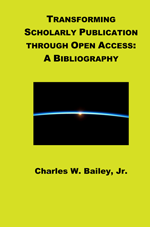What open access book has had over 11 million file requests? Answer: the Scholarly Electronic Publishing Bibliography. As of the end of 2011, it had over 11.9 million file requests.
The Scholarly Electronic Publishing Bibliography presents selected English-language articles, books, and other printed and electronic sources that are useful in understanding scholarly electronic publishing efforts on the Internet. The bibliography covers a wide range of topics, such as digital copyright, digital libraries, digital preservation, digital repositories, e-books, e-journals, license agreements, metadata, and open access.
Since initial publication, the digital versions of the Scholarly Electronic Publishing Bibliography have been freely available. On July 13, 2004, the Scholarly Electronic Publishing Bibliography was put under a Creative Commons Attribution-NonCommercial License.
The Scholarly Electronic Publishing Bibliography was published by the University of Houston Libraries from 10/25/1996 to 10/17/2006 (versions 1 to 64).
Digital Scholarship began publishing the Scholarly Electronic Publishing Bibliography with version 65 of the bibliography (11/02/2006).
Over the years, the bibliography has been made available in a variety of formats: HTML, Microsoft Word, paperback, PDF, and XHTML. Currently, 80 HTML/XHTML versions and three paperback/PDF versions have been published (Scholarly Electronic Publishing Bibliography: 2008 Annual Edition, Digital Scholarship 2009, and Scholarly Electronic Publishing Bibliography 2010).
The Scholarly Electronic Publishing Bibliography is archived at Digital Scholarship and the Internet Archive. The University of Houston Libraries have an incomplete archive that contains versions 60, 61, and 62.
| Digital Scholarship Overview | Digital Scholarship |


